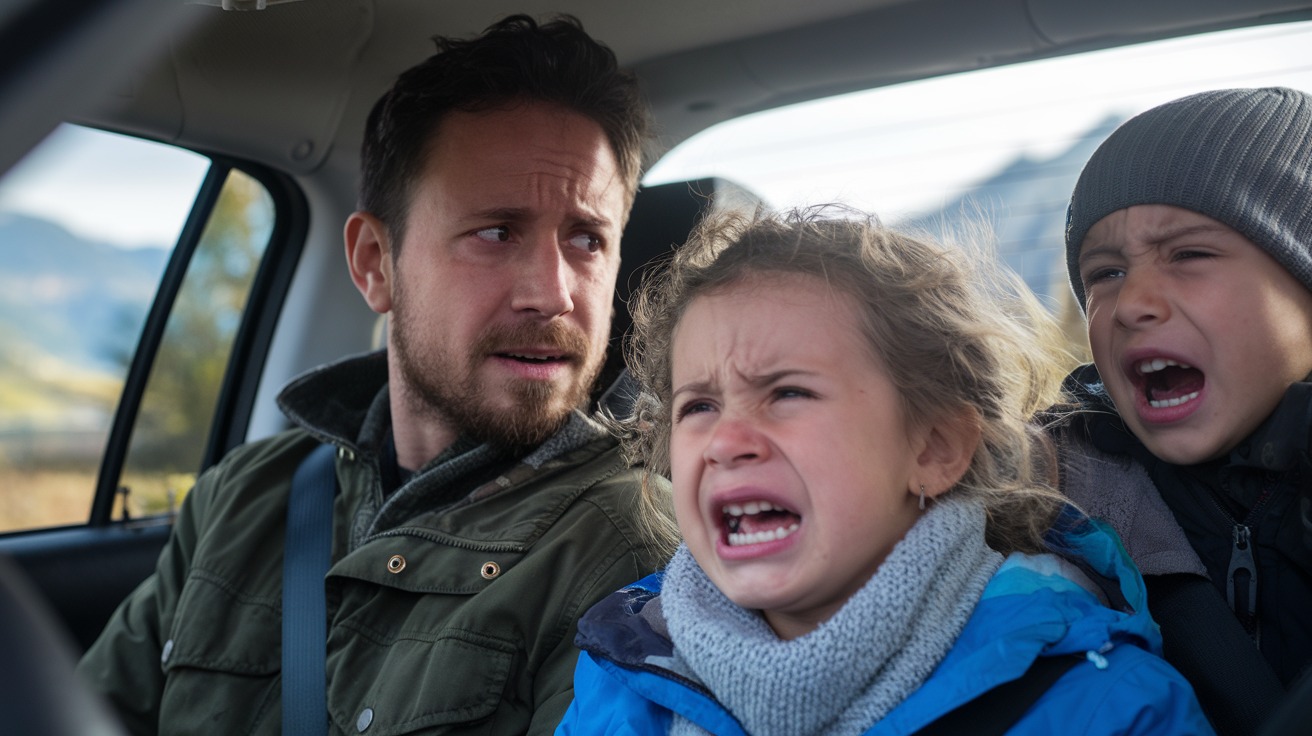My Ex-Wife’s Web Of Lies Nearly Cost Me Custody, But I Refused To Give Up
My ex-wife had plans to turn my life into a battlefield of accusations and relentless manipulation, pushing our children into a chaotic tug-of-war that left me desperate for a way out.
After thirteen years of marriage and two young children, Marvin, 6, and Jill, 4, I thought the storm was over when the divorce was finalized. I was wrong.
I met Donna, my new wife, who brought love and stability back into my life. But my ex-wife, Sara, made sure her shadow lingered over every moment. Her accusations were relentless, so bad that the court-mandated all communication goes through a designated app. I changed my number, moved, and thought this might put an end to her games.

Then I received this email from Sara:
Jill and Marvin report they were in a traffic accident with you this weekend. They said they were terrified as you yelled at the tow truck driver.
Both kids told me they were bitten by a dog at your parents’ house, Marvin’s hands apparently bruised and scraped, Jill with a chunk of skin missing. This is the second time they’ve reported dog bites with you. I’ll take them to the clinic to check for infections—dog bites are notoriously dirty.
I was also worried about you. Marvin says you couldn’t get out of the car because of your leg injury, that you seemed to struggle to unbuckle their seats from the driver’s side. Jill was frightened.
I deserve to know about any injuries from the accident, the dog bites, or if there’s anything more. We owe our children the reassurance that we’re working together.

The absurdity of her accusations was jaw-dropping. There was no “accident”, no tow truck, no shouting. My parents’ dog? He’d passed away months ago. And the only dog they’d seen over the weekend was an elderly chihuahua without teeth.
I vented to Donna, trying to keep my voice steady.
“She’s implying I don’t care about their safety, Donna. She’s painting me as some careless monster who yells at strangers and lets the kids get bitten!”
Donna put her hand on my shoulder, her expression torn between anger and sympathy. “It’s like she’s twisting reality. You’ve done everything possible to keep the kids safe and calm. You’d never put them in danger.”
But Sara wasn’t done. Her latest attack was just a prelude.
The custody arrangement required that I drop the kids off after weekends. Sara was late—again. I stood in the parking lot, checking the time, while Marvin and Jill asked anxiously, “When’s Mommy coming, Dad?”
After an hour, I finally left, figuring she’d pull her usual stunts about “just missing us.” Sure enough, messages flooded in as I drove home:
“I was right there. How could you leave like that?”
When I responded, telling her we’d waited over an hour, she turned it into a twisted game. “I’m here, right now. Just come back.”
Exhausted, I sent her the address of a spot closer to my house, somewhere she could easily reach. Hours passed, but she never showed. Finally, I texted her, “Let’s meet at the original location tomorrow, 11 a.m.”

The next morning, her tone changed. “I have a fever, can’t drive. You’ll have to bring them to me.”
My frustration boiled over. If she was too sick to pick them up, how could she handle taking care of them?
The day dragged on. I waited until evening, but she didn’t show. Eventually, I loaded the kids into the car and made the hour-long drive to her requested location. And there we waited.
At 8:51 p.m., I texted her. Minutes passed, then her reply came: “I won’t leave until you confirm you’re actually there.”
I replied six times. Even tried calling her, letting Marvin and Jill’s voices fill the line, hoping this would end the madness. Her response? “Hello? Hello? Anyone there?”
I clenched my fists, my voice shaking. “Sara, you’re playing games with our kids’ minds. Just show up.”
Finally, after two hours, I made the heart-wrenching decision to drive back. As we pulled away, Marvin whimpered from the back seat, “Why didn’t Mommy come, Dad?” Jill looked out the window, whispering, “Maybe she forgot us again.”

That night, as Donna tucked the kids into bed, I sat in the dark, weighed down by frustration and sadness. The kids deserved better than these mind games, and I was losing my strength to keep playing along.
The next day, I received a message accusing me of “abducting” our children. Now, on the advice of my lawyer, we’d entered into a court-mandated co-parenting plan, meant to act as a buffer between us, but it seemed to only make things worse.
Sara twisted every oversight, every missed message into an opportunity to accuse me. She’d demand I meet her at odd hours, switch locations without warning, or “forget” agreed meeting times, only to accuse me of being “unreliable.”
It’s as though she was building a case, brick by twisted brick, laying each accusation like a foundation to justify her next round of demands—trying to whittle away my custody rights little by little. And it wore me down. Each new accusation, each fabrication, each misrepresentation felt like a sucker punch, leaving me reeling.
In my darker moments, I considered surrendering. Maybe it would be better to just give in, let her have the kids full-time, if only to end this constant torment. But then I’d think of Marvin and Jill, of their innocent, confused faces, and I knew I couldn’t. I loved them too much to just abandon them. I couldn’t let her win—not when the stakes were my relationship with them.
Finally, after yet another bizarre exchange where Sara claimed I was “pretending” to have the kids with me and that she had seen my car “empty” at a stoplight, I had enough. With trembling hands, I picked up the phone and contacted my lawyer. It was time to push for full custody.
Sara’s tactics were escalating beyond games—this was now emotional abuse, both to me and to our children. I had a file full of her messages, her emails, her erratic behavior, all documenting a pattern of harassment and emotional manipulation.

I spent the next few days compiling everything—her fabricated stories, the time-stamped videos, even screenshots of her contradictory messages. Every minute spent going through it all felt like a step closer to protecting my children, but the process was grueling.
And for the first time in years, I felt a glimmer of hope. It was time to end this nightmare, not for me, but for Jill and Marvin. They deserved better than this toxic game of chess she was playing, and I owed it to them to fight.
After months of grueling preparation, the court date finally arrived. I felt both anxious and resolute, clutching the evidence we’d gathered over the years. This was my chance to prove to the court the truth about Sara’s actions and to show them the toll her behavior was taking on Jill and Marvin.
The courtroom was tense as Sara presented her accusations, layering her tales with feigned concern. But as my lawyer began to present our evidence, showing her contradictions, the relentless stream of emails, and even the video of the kids during the supposed “accident-free” weekend, Sara’s story began to crumble. The court took notice of the absurdity and escalation of her claims, and for the first time, it felt like the weight of the truth was tipping in my favor.
When the judge finally spoke, I felt the air leave my lungs. The ruling was clear: Sara’s attempts to alienate the children and her ongoing emotional manipulation would no longer be tolerated. I was granted full custody, with Sara’s visitation rights limited and supervised until she sought counseling.
As we walked out of the courtroom, a weight lifted from my shoulders. The war was finally over.
The first weekend we spent together as a family after the ruling felt different—calm, joyful, and unclouded by dread. Donna, the kids, and I spent the day at the park, flying kites and laughing as we let go of the past. Jill and Marvin seemed happier, free from the tension that had once loomed over our weekends. I could see their innocence returning, the worry leaving their eyes.
Months passed, and with therapy, Sara slowly began to make amends. Over time, she expressed a sincere desire to co-parent peacefully. She even joined a support group and acknowledged the damage she’d caused. Our interactions shifted from hostility to civility, and, eventually, we began working together in a way that truly centered on the kids’ best interests.
Jill and Marvin thrived, no longer caught between two worlds of conflict. Birthdays, school plays, and holiday gatherings became joyous, shared moments where they could feel love and support from both parents. And for the first time since the divorce, I felt the peace that comes from knowing my children were happy and secure.
In the end, we built something I’d once thought impossible: a harmonious family, no matter how unconventional.
This story is based on a true story. All the names in the story have been changed.

